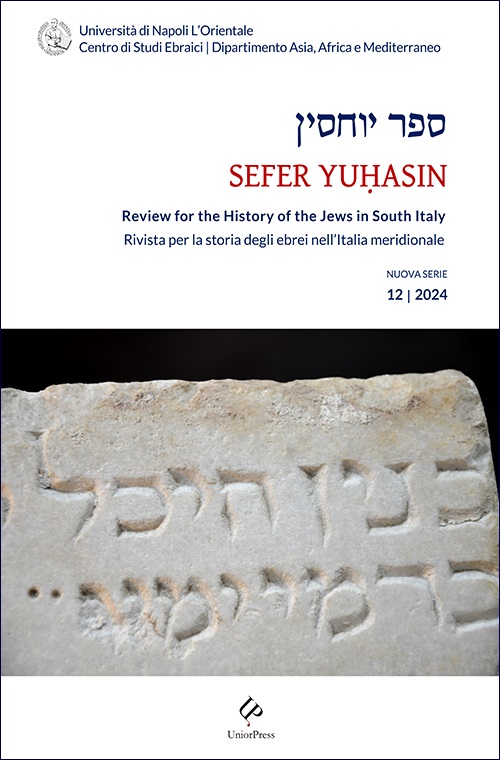Mercanti ebrei naufraghi sulle coste pugliesi dopo il 1541
DOI:
https://doi.org/10.6093/2281-6062/12605Abstract
L'articolo presenta e analizza sette documenti inediti che menzionano mercanti ebrei o merci appartenenti ad ebrei, naufragati in epoche diverse lungo le coste pugliesi tra il XVI e il XVII secolo: testimonianza, quindi, di presenza di ebrei nel Regno di Napoli ancora dopo il 1541, anno della loro espulsione. Ai documenti è premesso un breve accenno ai ruoli e alle responsabilità delle diverse figure istituzionali menzionate nei testi, utile per la comprensione delle diverse ragioni alla base delle numerose controversie che sorsero in tali circostanze tra diversi organi istituzionali ‒ il Sovrano, la Camera della Sommaria e il Regio Fisco, il Grande Ammiraglio, la Sacra Regia Corte, il portolano, il capitano, il giudice, il luogotenente ‒ e i mercanti ebrei, i cui interessi erano tutelati dai privilegi concessi loro da monarchi e papi, come nel caso delle navi ragusane o dei mercanti levantini.
Shipwrecked Jewish merchants and goods along the Apulian coasts after 1541
The paper presents and analyses seven unpublished documents mentioning Jewish merchants or goods belonging to Jews, shipwrecked in different times along the Apulian coasts between the 16th and 17th century: therefore, witnessing the presence of Jewish in the Kingdom of Naples after the 1541, the year of their expulsion. A short outline of the roles and responsibilities of the various institutional figures mentioned in the texts is allowed. It facilitates the understanding of the various reasons behind the many disputes that in such circumstances arose between different institutional bodies ‒ the Sovereign, the Royal Chamber of the Sommaria and the royal tax office, the Grand Admiral, the Sacred Royal Court, the portolan, the captain, the judge, the lieutenant ‒ and the Jewish merchants, whose interest were protected by the privileges monarchs and popes granted them, such as those related to the Ragusan vessels or the Levantines merchants.
Downloads
Downloads
Pubblicato
Come citare
Fascicolo
Sezione
Licenza
Gli autori che pubblicano su questa rivista accettano le seguenti condizioni:
- Gli autori mantengono i diritti sulla loro opera e cedono alla rivista il diritto di prima pubblicazione dell'opera, contemporaneamente licenziata sotto una Licenza Creative Commons - Attribuzione che permette ad altri di condividere l'opera indicando la paternità intellettuale e la prima pubblicazione su questa rivista.
- Gli autori possono aderire ad altri accordi di licenza non esclusiva per la distribuzione della versione dell'opera pubblicata (es. depositarla in un archivio istituzionale o pubblicarla in una monografia), a patto di indicare che la prima pubblicazione è avvenuta su questa rivista.
- Gli autori possono diffondere la loro opera online (es. in repository istituzionali o nel loro sito web) prima e durante il processo di submission, poiché può portare a scambi produttivi e aumentare le citazioni dell'opera pubblicata (Vedi The Effect of Open Access).


